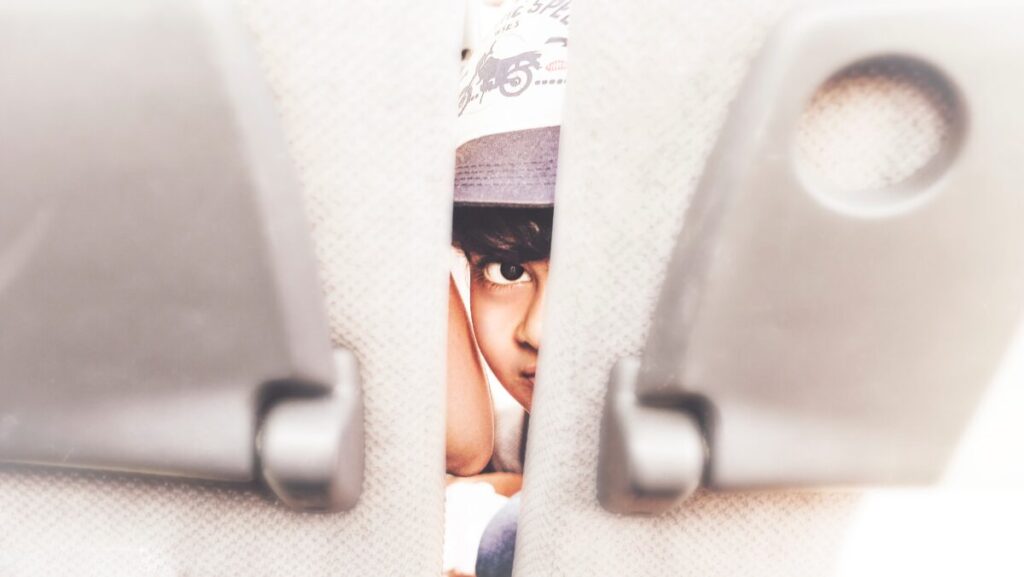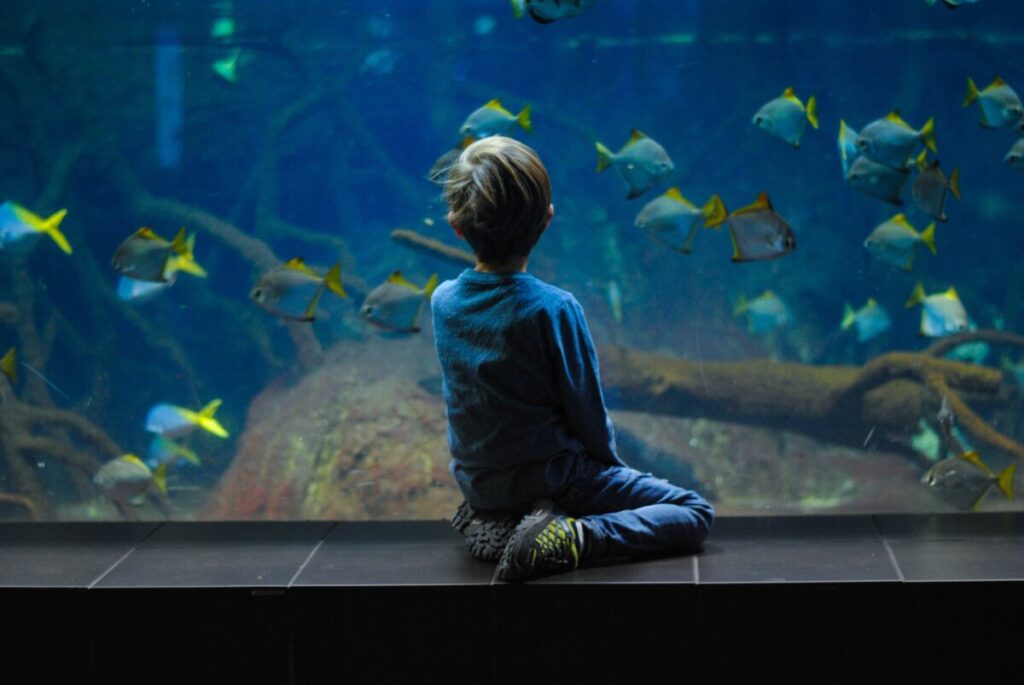Don’t Skip That Trip: Travel with Your Kids
Let’s face it: everything seems harder with kids especially with COVID-19. Things that you took for granted before — going grocery shopping, cooking dinner, eating dinner — are all more complicated when you throw kids and a pandemic into the mix. Going for a walk? Gotta take the stroller. Going to a friend’s house for lunch (and don’t forget masks!)? Better do it after nap time. Doing anything or being anywhere on time — impossible. Plans? What are those again? The effort it takes to get the kids from your house to the corner store feels like a herculean endeavor. What sadist would want to travel with kids?!
It’s true — traveling with kids takes more effort than traveling alone, or even with a partner. But like so many things, the effort brings great reward — and in the end, isn’t that why we travel? There are so many things our children can learn from traveling that they will never learn in a classroom! Here are a few reasons why we think the effort is worth the reward. (And, a few tips for keeping your sanity along the way.)

Why You Should Travel with Kids
Reason 1: Travel teaches kids to adapt.
When I first had my son, Jack, I read a lot of books that talked about the benefits of routine. “You should establish a regular nap schedule.” And, “Your child will benefit from having consistent meal times.” And, of course, “Develop a bedtime routine and stick with it!” Unfortunately, at that time in my life I was splitting my time between multiple houses to take care of sick family members and traveling for work. My choices were pretty limited. I could either leave Jack at home with my husband and his “routine,” or take him with me.
I opted to take my son with me as much as possible. What I discovered was that the more I traveled with my new baby, the easier it was for him to deal with changes in his routine. Instead of needing a specific nap time, nap routine, or his bed with all his stuff in it, Jack developed the ability to sleep whenever he needed to regardless of noise or comfort. Taking children out of their comfort zone often leads to them adapting to new environments more easily, which will serve them in all walks of life.
I won’t say that kids don’t need some routine or consistency to make them feel secure —that is a fact that has been established over many years and many studies by people way smarter than me. But kids are also extremely adaptable, and for most, consistency doesn’t need to mean staying at home and having their own bed to sleep in. When we started traveling with Jack, we would always take his “sheepy” along (a sheepskin he’s slept on since babyhood) so that he had a familiar something to sleep on, no matter where we were. Our philosophy: Have sheepy, will travel!
Tip 1: Don’t try to maintain your home routine when traveling, but do bring along one or two comfort items that will soothe your kids and make them feel at home. Always make them a priority when packing.
Reason 2: When you travel with kids it broadens their palate.
I have a friend whose kids are picky eaters. I’m not talking about kids who don’t like brussel sprouts or don’t want to finish their peas. These kids won’t eat any vegetables. Not if they can see them. They also won’t eat seafood of any kind. They love French fries (of course) but won’t eat baked potatoes or scalloped potatoes or sweet potatoes. They’ll eat hamburger meat if it’s smashed on a bun, but not if it’s mixed into a casserole. They won’t try anything new, and if they do they will inevitably “hate it”. They gag at mealtime and refuse to eat anything that’s different than what they’re used to. It drives me crazy — I’m just not used to that sort of defiance.
My kid eats everything. Part of that is probably because eating is one of my pet peeves; I don’t allow my son to get away with rudeness at the table or dismissal of food that someone has made for him. In our house, the rule is that you have to try everything on your plate. And to try it means to take at least three bites. You also have to try it every time it is served because our palates change as we get older. Even if you didn’t like it the last time you tried it, you might like it this time. I suspect that the real reason Jack eats everything, though, is that he’s just been exposed to a lot more food than my friend’s kids. When we were traveling he didn’t have the choice to eat a grilled cheese sandwich instead.

When Jack was three, I took him to visit friends in Ecuador. We were there for my birthday, and they threw me a big parillada (bbq) on the beach, complete with freshly-caught grilled fish. Grilled fish in Ecuador is sort of a grizzly affair. With their guts cleaned out, but heads and tails intact, it feels like the fish is watching you eat it. Three-year-old Jack was way into Finding Nemo on that trip, and he immediately broke down in sobs upon being presented with the watchful (but very cooked) fish on his plate. There was no way he was eating that fish! He might even become a vegetarian! That lasted about five minutes, until his friend, Kai got his fish and started digging in.
Once Jack realized that Kai liked eating the fish, that all the other kids at the table were actually loving the fish, it didn’t seem nearly so creepy. Soon he was digging into his own fish. (It also helped that he was hungry, and there were no options besides the fish). The next year, when we traveled through Scotland, he actually asked to try the haggis being served for breakfast — even though we’d already explained to him what it was made from.
Tip 2: When you visit foreign countries while traveling with kids, encourage them to try foods that they wouldn’t be exposed to at home. If they are generally picky eaters, you can find out ahead of time what local kids love to eat, and start with that. Sometimes it helps to see other kids eating, and they will still be trying something different.
Reason 3: Travel time is family time.
If you’re like me, you struggle with getting your kids to tear their eyes away from the electronics and spend some quality time with the family. It’s a modern challenge; one our parents didn’t face, and one we are still trying to navigate. Traveling with kids doesn’t always solve this problem since most people travel with electronics (they can be handy at times, I’ll admit). But, I find that it is definitely easier to have quality family time while on a trip together than it is to make it happen at home. For one thing, access to power sources is limited while traveling, whether you are on a road trip or flying overseas, so your electronic devices have a correspondingly limited lifespan. You can easily use this to your advantage by reminding your kids to “save the batteries” and hang out with you instead.
Additionally, it is easier to find something to stimulate your kids’ interest when you’re traveling since everything is new and exciting. “Let’s go check out the zip line course!” Or, “Did you know they have a woolly mammoth at the natural history museum?” Or, “I heard we could dig for clams right down on the beach!” all sound more intriguing to your kids than another family game night.
Annette told me that taking her daughter on a white-water rafting trip was the best bonding experience she could imagine. Doing new and exciting things with your kids will form strong bonds between you and make memories to last a lifetime. And you won’t even need to ground them to get them from the tablet.
Tip 3: When planning a trip with your kids, always include a few things in your itinerary that you know will interest them. Also, if you’re going to take the electronics, leave the extra battery pack at home. Let those batteries die a natural death.
Reason 4: Traveling with kids teaches them history, geography and cultural awareness.
I grew up in a single-parent household, and traveling abroad was not in the budget. I also grew up in a small town, mostly comprised of middle-class, white, America-born citizens. I had a pretty narrow view of the world and what was in it, and school wasn’t much help. I hated history class, memorized my geography lessons using cute acronyms, and thought “culture” meant nice restaurants and museums. None of it resonated with me until I was able to see it with my own eyes. There is nothing quite like standing inside a castle built 4,000 years ago to remind you how long civilization has been around.
When we expose our children to other cultures, we expand their worldview, and make them more sympathetic to people’s differences. I remember standing on a sandy street in a little fishing village in coastal Ecuador, and having 3-year-old Jack whisper in my ear “I’m different than everyone else, Mom.” I’m sure that was the first time he’d ever felt that way. It was a humbling experience, for him and for me, but ultimately a beneficial one.
Tip 4: If you have the opportunity, wrap something into your trip that feeds off your child’s interests or things they’ve learned in school. We took the chance to go “searching for Nessie” while in Scotland, because 4-year-old Jack loved dinosaurs and mysteries. It was a great opportunity to talk about the geography and history of Scotland, and the difference between history and mythology.

Reason 5: Traveling with kids helps them develop social skills.
Okay, maybe this isn’t a problem for everyone, but I was painfully shy as a child. I was the little curly-haired girl hiding behind my Mom’s legs and not speaking to anyone. I was probably in high school, or maybe even college, before I learned any social skills. Trying to make friends has always been a challenge for me. As luck would have it, I married an introvert, so you can see how I might be concerned about the social prospects of our only child.
When we first started traveling with Jack, he was pretty shy. Especially when traveling abroad— he didn’t always understand the language (even if it was English), and sometimes people looked different. He was intimidated by all the newness. Inevitably, his shyness was overcome by curiosity and interest.
The more we traveled with Jack, the easier it became for him to assimilate. He would approach people and talk to them, make friends with random kids, and basically carve out a niche for himself wherever we went. I remember a four-hour layover in some mid-western airport, waiting on a flight to Amsterdam, and our gate was at the end of this long, empty hall full of big, empty gates. A few other people loitered about, waiting on random flights, but clearly, nothing was pending. During our wait, Jack unpacked all his travel toys (he had a pack full for the trip), managed to scrounge part of some woman’s lunch snack, struck up a conversation with a couple from London, and found another little boy his age to play with. (That boy ended up on our flight, and the two of them got yelled at by some grumpy man for running around the aisles while he was trying to sleep.)
Travel provides kids with the opportunity to meet and interact with people of all different ages and backgrounds. Being naturally curious and inquisitive, your kids will grab that opportunity and run with it.
Tip 5: Encourage your kids to be independent and interact with people during your trip, but always stay vigilant. It’s important to talk to your kids about maintaining the same “stranger danger” precautions for travel as you would at home.
Reason 6: Travel lets us explore our own backyard.
You don’t have to leave the country to give your kids the benefits of travel. The United States is a huge, diverse country that people travel from all over the world to see. Whether you take a road trip in your campervan, tour the National Parks, or head south for the winter, your kids will end the trip with a better understanding and appreciation of the country they live in. Road trips have their own special appeal to kids. The trip itself can be interesting and exciting, instead of just something to endure until you get there. If you take a scenic route, you have opportunities to talk about geologic formations, mountain ranges, wildflowers, and local sights. There might be an attraction that catches your child’s eye, and you can take a 15-minute break from driving to check it out.
When we were on a road trip with 6-year-old Jack, headed to Arizona to visit his great-Aunt, we turned off for a random sign in the middle of nowhere that said “Dinosaur Tracks”. Somewhere in the vast territory of the Navajo Reservation, a few tents were set up with souvenirs, brochures, and guides to take you around the desert hardpan, where you could see petrified dinosaur poop and a variety of different-sized tracks in the stone. Jack was starting to complain a bit before we saw that sign, but a quick stop and a walk back through time to stretch our legs, and he was content again for a couple of hours. And with plenty of things to talk about!
Tip 6: If you can, be flexible during road trips. Let your kids help decide how often you stop and keep your eyes open for unexpected opportunities to capture their interest. Having some say in your itinerary will keep them engaged in the trip.
Reason 7: We love to travel, so why wouldn’t our children?!
I’ve heard people say, “Why would you travel with small children? They don’t appreciate it, or even remember it!” True, young kids are not necessarily going to appreciate the rich history of that castle or the incredible artwork displayed in that museum. They might complain about the long car ride and “boring scenery”. But, what you are doing is exposing your kids to a whole lot of new sights and information, and it takes time for those things to be processed.
Rest assured knowing that even if you don’t think your child is getting anything out of that family vacation, you will see the differences it makes in all areas of her life. For all the reasons we talked about above, travel and exposure to new and different experiences will shape your child to be more adaptable to new situations; to more easily interact socially with people of different backgrounds and age groups; to have a broader perspective of culture and food, and be more comfortable with their place in the world. Best of all, though, it will instill in them a love of travel and adventure that will motivate their entire lives.
Tip 7: Kids are never too young to travel! Make accommodations for their age, as needed, but don’t use your child as an excuse to miss that next trip. Find a way to take them with you – they will thank you for it later.





